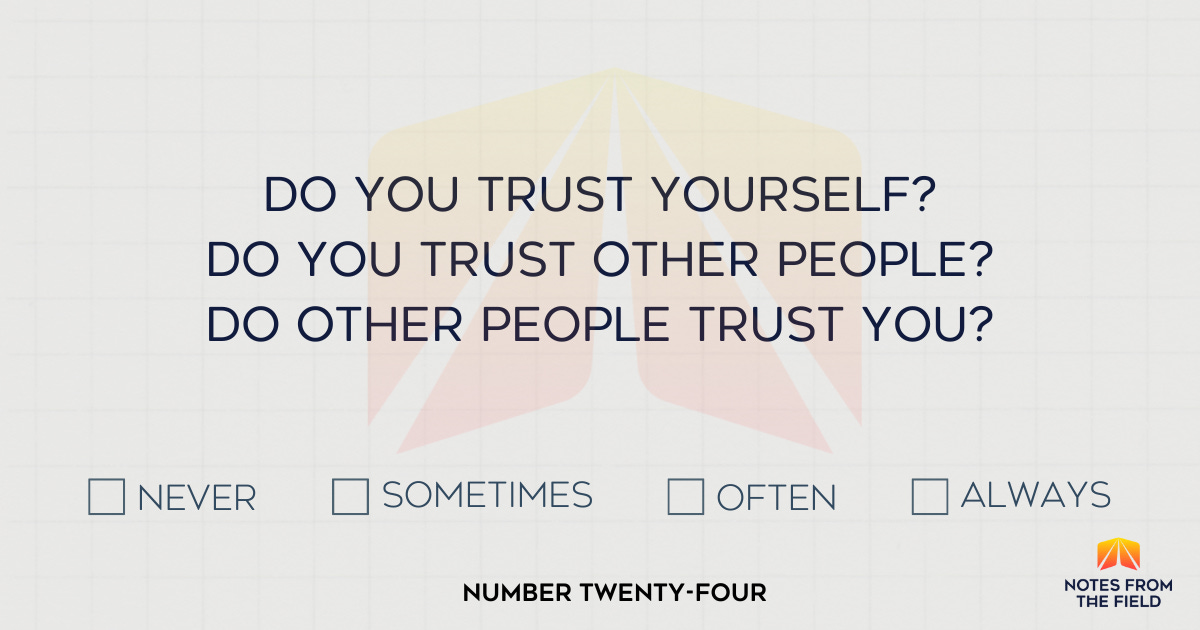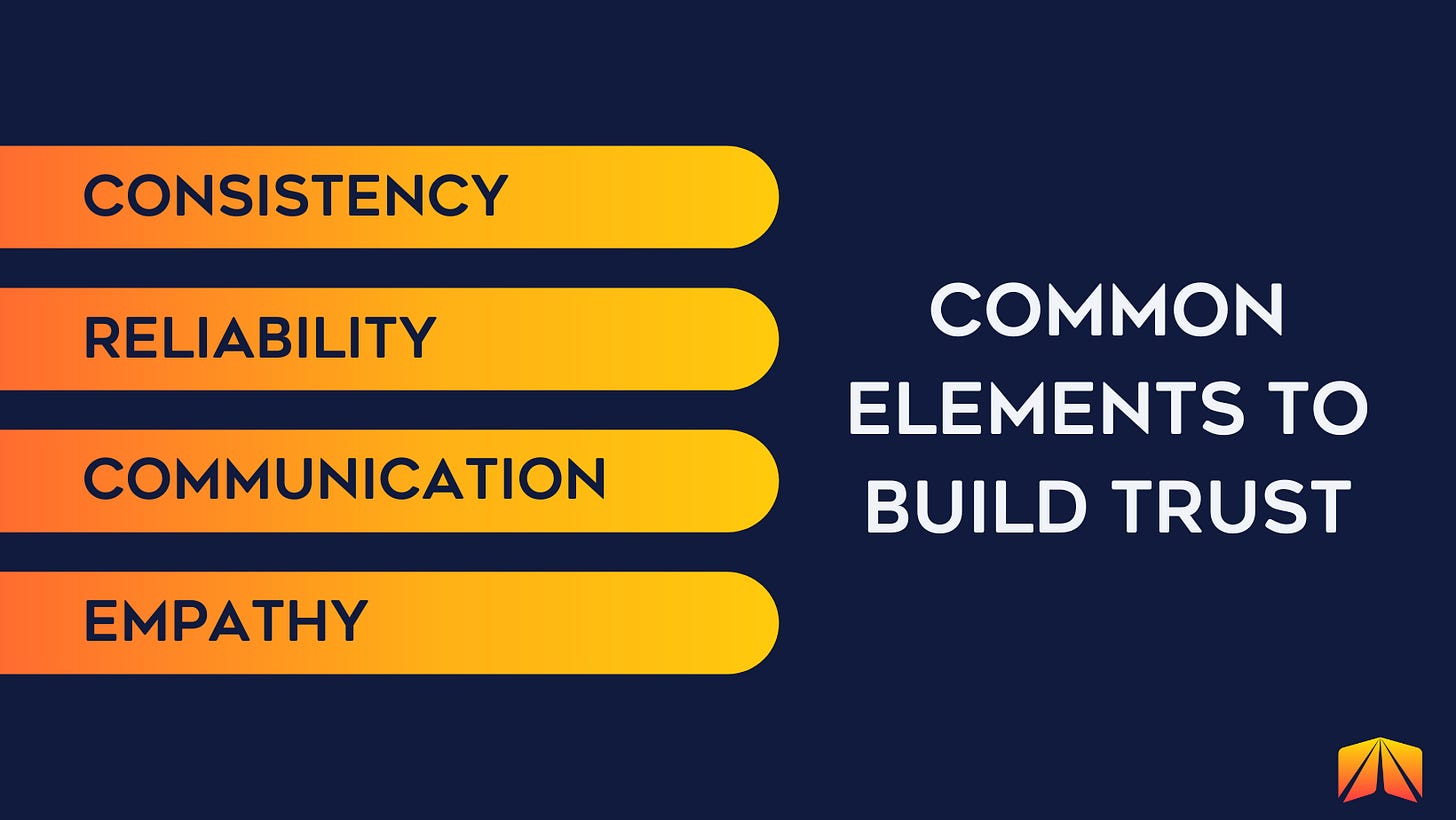On Trust: Understanding, Building, and Eroding Trust
Trust is the cornerstone for all relationships, both personal & professional.
In both our personal and professional lives, trust is the cornerstone that supports strong relationships, effective collaboration, and meaningful achievements. It's more than a nice-to-have quality; it's a fundamental building block for any successful endeavor.
Understanding Trust
Trust is often considered an intangible quality, but we can break it down into a formula that helps make its components more tangible:
Demonstrated Expertise
Demonstrated expertise is showing that you have the skills, knowledge, and competence to do what you say you will do. In a professional setting, this could be a manager who consistently delivers results, a colleague who always meets deadlines, or a team member who can troubleshoot complex issues effectively. Demonstrated expertise builds trust because it proves that you are reliable and capable.
Imagine you're working on a project with other people. If your team members have consistently shown they can handle their tasks expertly, you're more likely to trust them with critical responsibilities. This trust in their expertise fosters a sense of security and confidence within the team, enabling everyone to work more effectively and collaboratively.
Shared Experiences
Shared experiences are the interactions and history you have with others. These experiences, whether positive or negative, shape your perception of trustworthiness. When you work closely with someone, share challenges, celebrate successes, and navigate obstacles together, you build a reservoir of shared experiences that strengthens trust.
Consider your relationships with friends. The more experiences you share—such as supporting each other through difficult times or celebrating joyous moments—the deeper your trust becomes. The same principle applies in professional environments. Teams that have weathered storms together often emerge with stronger bonds and higher levels of trust.
Common Values
Common values are the professional, ethical, and moral principles that you and others hold dear. When you share common values with someone, you're more likely to trust their intentions and actions. Common values create a sense of alignment and mutual understanding, making it easier to work towards common goals.
In the workplace, common values might include a commitment to integrity, a dedication to customer satisfaction, or a passion for innovation. When employees share these values, they are more likely to trust each other, agree on the same goals and work harmoniously. Similarly, in personal relationships, common values such as honesty, respect, and kindness form the foundation of deep, trusting connections.
Putting It All Together
By combining demonstrated expertise, shared experiences, and common values, you create a strong foundation for trust. Each element reinforces the others, making trust more resilient and robust. For example, if a colleague has proven their expertise, been part of numerous positive experiences with you, and aligns with your core values, you are more likely to have trust with that person.
Understanding this formula for trust helps demystify what might otherwise seem like an abstract concept. It gives us a practical framework for both building and assessing trust in various relationships.
Building Trust
Building trust is a deliberate and ongoing process that requires consistency, communication, and empathy. Whether in a personal or professional context, these elements are crucial for establishing and maintaining trust.
Consistency
Consistency is the bedrock of trust. When people know they can rely on you to behave predictably and deliver results consistently, trust flourishes. This means showing up on time, meeting deadlines, and following through on commitments. Inconsistency, on the other hand, breeds uncertainty and doubt, undermining trust.
Reliability
In a professional setting, being reliable is about doing what you say you will do. If you promise to complete a report by Friday, ensure it's done. If you commit to a meeting, be there on time, fully present and prepared. Consistent behavior builds a reputation of dependability, which is key to building trust.
Communication
Clear, honest, and open communication is an important element of trust. People need to feel that they are being heard and that their opinions matter. Effective communication involves both speaking and listening. It means being transparent about your intentions, sharing relevant information, and providing constructive feedback.
Empathy
Empathy is the ability to understand and share the feelings of another person. It involves putting yourself in someone else's shoes and seeing things from their perspective. Empathy is crucial for building deep, trusting relationships because it shows that you care about others' experiences and well-being.
In personal relationships, showing empathy means being there for friends and family during tough times, celebrating their successes, and understanding their struggles. In professional settings, it might mean considering the workload and stress levels of your colleagues before assigning new tasks or providing support when someone is facing a personal challenge.
Practical Tips for Building Trust
Be Consistent: Ensure your actions align with your words. If you commit to something, follow through consistently.
Communicate Openly: Share information transparently, listen actively, and provide honest feedback.
Show Empathy: Take the time to understand others' perspectives and show that you care about their feelings and experiences.
Be Accountable: Own up to your mistakes and take responsibility for your actions. Accountability is key to maintaining trust.
Build Rapport: Invest time in getting to know people. Shared experiences and personal connections strengthen trust.
Respect Boundaries: Understand and respect the boundaries of others. This shows consideration and builds mutual respect.
Building trust is not a one-time effort but a continuous process that requires attention and effort. By being consistent, communicating openly, and showing empathy, you can create strong, trusting relationships that enhance both personal and professional life. Trust is the glue that holds relationships together, and investing in it is one of the most valuable things you can do.
Eroding Trust
While building trust is a deliberate and ongoing process, it can be easily undermined by certain behaviors and actions. Understanding what erodes trust is crucial for maintaining healthy personal and professional relationships. Common behaviors that undermine trust include:
Dishonesty
Dishonesty, whether through outright lies or misleading information, is one of the most significant trust breakers. When someone discovers they've been deceived, it can create feelings of betrayal and resentment, making it difficult to trust that person again.
Inconsistency
Inconsistent behavior, such as failing to keep promises or frequently changing one's stance, creates uncertainty and doubt. People need to know they can rely on others to act predictably and uphold their commitments.
Lack of Accountability
Refusing to take responsibility for one's actions or mistakes erodes trust. When individuals consistently deflect blame or make excuses, it signals a lack of integrity and reliability.
Poor Communication
Failing to communicate openly and honestly can lead to misunderstandings and mistrust. Withholding information, being evasive, or not listening to others' perspectives undermines the foundation of trust built through clear communication.
Disrespect
Showing a lack of respect for others' boundaries, opinions, or feelings can significantly damage trust. Respect is a fundamental component of trust, and its absence can lead to strained relationships and conflicts.
Breaking Confidentiality
Sharing information that was meant to be kept private or breaking confidences can shatter trust. People need to feel secure that their personal information is treated with respect and discretion.
Consequences of Lost Trust
Eroded trust can lead to decreased morale, productivity, and collaboration. When team members do not trust each other or their leaders, communication breaks down, and the overall effectiveness of the team is compromised. This can result in higher turnover rates, lower job satisfaction, and reduced organizational success.
Losing customer trust can have severe financial implications. Customers who feel deceived or mistreated are likely to take their business elsewhere and may share their negative experiences with others. This can damage the company's reputation and lead to a loss of revenue and market share.
Understanding the behaviors that erode trust is essential for maintaining strong personal and professional relationships. By avoiding dishonesty, inconsistency, poor communication, and other trust-damaging behaviors, we can protect and nurture the trust we have built with others.
Call to Action
Building and maintaining trust is an ongoing journey that requires deliberate effort and continuous learning. As you move forward, commit to practicing the principles of trust in every aspect of your life. Be consistent in your actions, communicate openly and honestly, show empathy, and hold yourself accountable. By doing so, you will create an environment of trust that enhances your relationships and leads to greater personal and professional success.
Remember, trust is not something that happens overnight. It is built through small, consistent actions over time. Invest in trust, nurture it, and watch how it transforms your interactions and achievements. Trust is the key to unlocking deeper connections, more effective collaboration, and a more fulfilling life.
Ready to dig deeper into the topic of trust? We recommend:
To Read
Book: "The Speed of Trust" by Stephen M.R. Covey
Book: "Building Trust: In Business, Politics, Relationships, and Life" by Robert C. Solomon and Fernando Flores
Article: “Five Powerful Strategies to Build Trust in the Workplace” by Caroline Castrillon
Book: “The Thin Book of Trust: An Essential Primer for Building Trust at Work” by Charles Feltman
To Listen
Podcast: Building Trust by Dear HBR
Podcast: Building Trust & Connection by Think Fast, Talk Smart
To Watch
TEDX: The Psychology of Trust by Anne Böckler-Raettig
TEDX: How to Build (and Rebuild) Trust by Francis Frei





